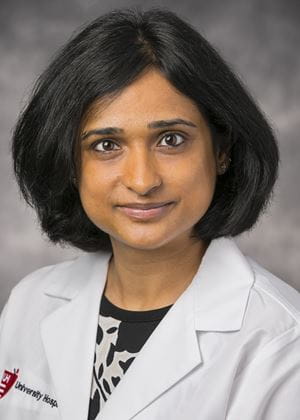Insight on Inflammatory Bowel Disease
June 07, 2018
New gastroenterologist is one of just two IBD specialists in the UH system
UH Clinical Update - June 2018
Among gastrointestinal conditions, inflammatory bowel disease (IBD) is arguably among the most complex to manage. The disease, whether in the form of Crohn’s or ulcerative colitis, can have manifestations outside the digestive tract, requiring close coordination with the primary care provider and the entire care team. What’s more, the biologic and other therapies used to treat IBD can have serious side effects, increasing patients’ risk of infection. Combine this with the reality of unhappy patients struggling with embarrassing symptoms, and the challenge of IBD management is clear.
Fortunately, UH gastroenterologist Preetika Sinh, MD, is up for a challenge. Now in her first year at UH, she’s one of just two gastroenterologists seeing exclusively IBD patients at UH Cleveland Medical Center, UH Ahuja and UH Chagrin Highlands Health Center. According to Dr. Sinh, it’s a responsibility she takes incredibly seriously.
 Preetika Sinh, MD
Preetika Sinh, MD“IBD is a life-long disorder, and patients are managed on strong medications and immunosuppressive therapies,” she says. “It is very important that these patients are managed appropriately. If they’re not managed closely, it can lead to surgery, frequent inpatient admissions and multiple ER visits.”
Dr. Sinh earned her medical degree at Lady Hardinge Medical College of the University of Delhi. Following residency training in internal medicine at John H. Stroger Jr. Hospital of Cook County in Chicago, she completed fellowship training in gastroenterology at the University of Kansas Medical Center and School of Medicine. Dr. Sinh completed a second fellowship in inflammatory bowel disease at Cleveland Clinic.
With the advent of two new biologic therapies for IBD in the past few years, options have expanded for patients, Dr. Sinh says. But if anything, that has made her job even more complex – and necessary.
“In the last two to three years, we’ve seen Entyvio (vedolizumab) for both ulcerative colitis and Crohn’s and Stelara (ustekinumab) just for Crohn’s,” she says. “Remicade (infliximab), Humira (adalimumab), Cimzia (certolizumab) and Simponi (golimumab) are all the same class of medication. Entyvio is a different class. It has a different mechanism, and Stelara has a different mechanism still. When we only had Remicade, we used it for everybody. But now that we have the choice, we can make decisions based on the patient’s disease, the medication’s risk profile and mechanistically how it works. Those three aspects help determine which patients might do better with which drug.”
Dr. Sinh says she values the relationship she builds with patients – especially because IBD can be so challenging.
“You get to know them, their priorities, their health,” she says. “The most rewarding thing is once they turn around and start doing better. Sometimes people forget how sick they were when they were undiagnosed and untreated. We do have to do a lot of hand-holding, but that’s what we’re here for.”
She adds that she’s eager to work with her UH colleagues in cooperatively managing IBD patients.
“The primary care provider and our care team should work hand in hand,” she says.
For more information about Dr. Sinh or to refer a patient, please call 216-844-1995.
Tags: IBD


